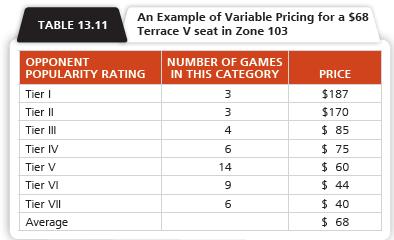2. The Magic used its original pricing systems of several years ago and set the price for...
Question:
2. The Magic used its original pricing systems of several years ago and set the price for a Terrace V, Zone 103 seat at $68 per game.
There were 230 such seats not purchased as part of season ticket packages and thus available to the public. If the team switched to the 7-price dynamic system (illustrated in Table 13.11), how would the profit-contribution for the 45-game season change?
(Note that the 45-game season includes 4 preseason games.)
Revenue management was once the exclusive domain of the airline industry. But it has since spread its wings into the hotel business, auto rentals, and now even professional sports, with the San Francisco Giants, Boston Celtics, and Orlando Magic as leaders in introducing dynamic pricing into their ticketing systems. Dynamic pricing means looking at unsold tickets for every single game, every day, to see if the current ticket price for a particular seat needs to be lowered (because of slow demand) or raised (because of higher-thanexpected demand).
Pricing can be impacted by something as simple as bad weather or by whether the team coming to play in the arena is on a winning streak or has just traded for a new superstar player. For example, a few years ago, a basketball star was traded in midseason to the Denver Nuggets; this resulted in an immediate runup in unsold ticket prices for the teams the Nuggets were facing on the road. Had the Nuggets been visiting the Orlando Magic 2 weeks after the trade and the Magic not raised prices, they would have been “leaving money on the table” (as shown in Figure 13.5).
As the Magic became more proficient in revenue management, they evolved from (l) setting the price for each seat at the start of the season and never changing it; to (2) setting the prices for each seat at season onset, based on the popularity of the opponent, the day of the week, and the time of season (see the Video Case in Chapter 4)—but keeping the prices frozen once the season began (see Table 13.11); to (3) pricing tickets based on projected demand, but adjusting them frequently to match market demand as the season progressed.
To track market demand, the Magic use listed prices on Stub Hub and other online ticket exchange services. The key is to sell out all 18,500 seats every home game, keeping the pressure on Anthony Perez, the director of business strategy, and Chris Dorso, the Magic’s vice president of sales.

Step by Step Answer:

Operations Management: Sustainability And Supply Chain Management
ISBN: 9780135225899,9780135202722
13th Edition
Authors: Jay Heizer; Barry Render; Chuck Munson






